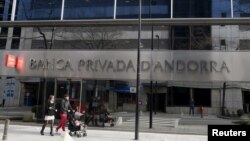A bank in the tiny European state of Andorra has become the focus of investigations by the United States, Venezuela, and others as a locus of corruption activity.
Andorra is a tiny speck of a state – only 468 square kilometers – on the eastern border between France and Spain. Because it is independent, Andorra has become a center for financial services. A major bank there stands accused of being deeply mired in multinational corruption.
Banca Privada d’Andorra (BPA) has been named as a money laundering operation by the U.S. Treasury’s Financial Crimes Enforcement Network. BPA is also under investigation by other nations for laundering and other illicit activities.
U.S. Treasury said in a March news release that “for several years, high-level managers at BPA have knowingly facilitated transactions on behalf of third-party money launders acting on behalf of transnational criminal organizations.”
BPA holds some $6.3 billion in assets and has about 15,000 clients.
The department has also barred U.S. banks from providing services to BPA – or to any other bank that does business with BPA. The net effect of that action, according to attorney Jay Nanavati at the Washington law firm Baker Hostetler, is to “effectively shut the bank out of the dollar–based international banking system.”
Andorran authorities responded by suspending the bank’s board and its chief executive, Joan Pau Miquel Prats, who was arrested on corruption charges.
“Andorra has initiated a transformation process and is committed with transparency, international standards of exchange of information, and the fight against money laundering,” Andorra’s Finance Minister Jordi Cinca said in a statement.
These steps were being taken, Cinca said, “to preserve our position as a world-class financial center.”
Uneasy alliance
The BPA probes have provided an uneasy alliance between the United States and Venezuela who have been a political odds in the Americas.
On March 24, Venezuela’s Chief Prosecutor, Luisa Ortega Diaz, announced an investigation into the state’s oil company, known by the initials PDVSA and whether its senior officials siphoned at least $2 billion from the company and hid it in BPA. This came after the arrest in February by Venezuelan authorities of Jose Luis Parada, PDVSA’s production chief for the country’s western region, on corruption charges. Also recently nabbed for alleged corruption was Venezuelan oil ministry official Nubia Parada.
The U.S. Treasury report says BPA funneled at least $4.2 billion for Venezuela, some of it routed through the U.S. banking system. Treasury also says the Andorran bank also handled “the proceeds of organized criminals in Russia and China, foreign corruption, and other criminal activity.”
Treasury says that a high level BPA manager worked closely with Andrei Petrov who acted on behalf of Russian criminal organizations. Petrov, according to Treasury, is also suspected of being connected to a U.S. “Ten Most Wanted” fugitive, Semion Mogilevich. Spanish authorities arrested Petrov in February 2013 on money laundering allegations.
Russia, China connection
Porter McConnell, of the Washington-based Financial Transparency Coalition, said Russian involvement has long been watched by U.S. authorities.
“It’s fitting that FinCEN singled out Russian money entering Andorra in its notice, as Russia loses the second-highest amount of illicit financial outflows in the world,” McConnell told VOA via e-mail. “With any movement of money, you need an actor on both ends, and Andorra has served as low hanging fruit – an easy and hassle-free target for dirty money.”
U.S. authorities also say there is a China connection too.
The Treasury reports say alleged money launderer Gao Ping “acted on behalf of a transnational criminal organization engaged in trade-based money laundering and human trafficking, sending some of the proceeds to shell companies in China.” He is also accused of acting on behalf of a number of Spanish business persons. Ping was arrested by Spanish authorities in September 2012.
The Andorran bank, like others who allegedly hold and move illicit funds worldwide, typically handle money from shell companies designed to obscure its true owners.
“Criminals use of entities including Panamanian foundations, Liechtenstein financial entities, Seychelles international business companies, and numerous other blocking structures,” attorney Nanavati told VOA via e-mail.
It “makes it exceedingly difficult for banks to identify the true beneficial owners of their accounts. Facilitators, typically lawyers and financial advisors all over the world, have made careers of setting [up] such structures for their clients,” he said.
No accountability
At the transparency and better-governance group Global Financial Integrity, Heather Lowe, director of government affairs, says banks like BPA have not been sufficiently targeted in anti-corruption crackdowns.
“Regulators and prosecutors have not traditionally held these facilitators accountable in a way that dissuades them and their colleagues from getting involved,” Lowe told VOA via e-mail. “This is one of the biggest loopholes facilitating the flow of dirty money worldwide.”
Lowe said banks most monitor their employees and their activities to catch illicit transactions.
“We strongly urge prosecutors to hold any of BPA’s employees who knowingly violated the law to personally account for their actions,” she told VOA. “There will not be substantial progress on combatting money laundering through major financial institutions until individual actors [officials] within those banks feel they will be held accountable for their actions.”





